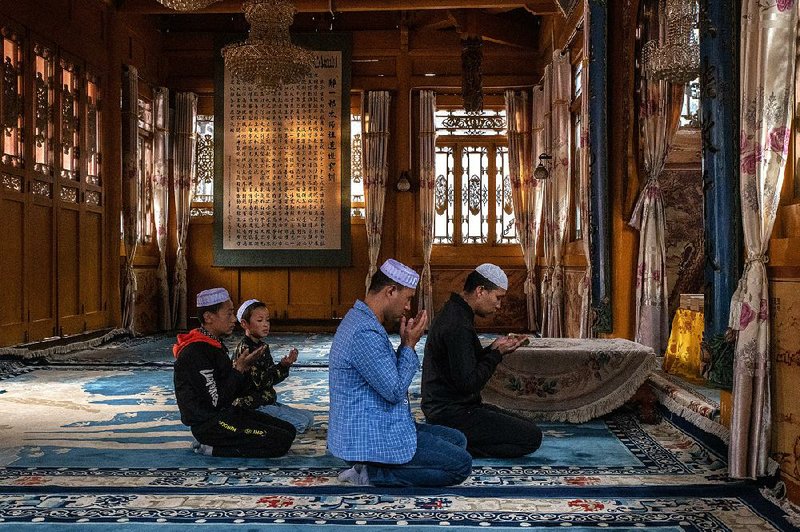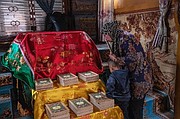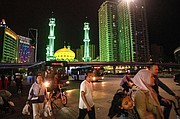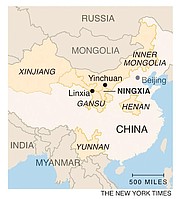YINCHUAN, China -- In China's northwest, the government is stripping the most overt expressions of the Islamic faith from a picturesque valley where most residents are devout Muslims. Authorities have destroyed domes and minarets on mosques, including one in a small village near Linxia, a city known as "Little Mecca."
Similar demolitions have been carried out in Inner Mongolia, Henan and Ningxia, the homeland of China's largest Muslim ethnic minority, the Hui. In the southern province of Yunnan, three mosques were closed. From Beijing to Ningxia, officials have banned the public use of Arabic script.
This campaign represents the newest front in the Chinese Communist Party's sweeping rollback of individual religious freedoms, after decades of relative openness that allowed more moderate forms of Islam to blossom. The harsh crackdown on Muslims that began with the Uighurs in Xinjiang is spreading to more regions and more groups.
It is driven by the party's fear that adherence to the Muslim faith could turn into religious extremism and open defiance of its rule. Across China, the party is now imposing new restrictions on Islamic customs and practices, in line with a confidential party directive, parts of which have been seen by The New York Times.
The measures reflect the hard-line policies of China's leader, Xi Jinping, who has sought to reassert the primacy of the Communist Party and its ideology in all walks of life.
The campaign has prompted concerns that the repression of Uighur Muslims in the western region of Xinjiang has begun to bleed into other parts of China, targeting Hui and other Muslims who have been better integrated than Uighurs into Chinese society. Last year, a top party official from Ningxia praised Xinjiang's government during a visit there and pledged to increase cooperation between the two regions on security matters.
Haiyun Ma, a Hui Muslim professor at Frostburg State University in Maryland, said the crackdown was continuing a long history of animosity toward Islam in China that has alienated believers.
"The People's Republic of China has become the world's foremost purveyor of anti-Islamic ideology and hate," he wrote in a recent essay for the Hudson Institute. "This, in turn, has translated into broad public support for the Beijing government's intensifying oppression of Muslims in the Xinjiang region and elsewhere in the country."
None of the new measures, so far, have approached the brutality of Xinjiang's mass detentions and invasive surveillance of Uighurs. But they have already stirred anxiety among the Hui, who number more than 10 million.
"We are now backtracking again," Cui Haoxin, a Hui Muslim poet who publishes under the name An Ran, said from Jinan, south of Beijing, where he lives.
To Cui, the methods of repression that are smothering Uighur society in Xinjiang now loom over all of China. "One day, this model will not only target Muslims," he said. "Everyone will be harmed by it."
'SINICIZATION OF ISLAM'
Islam has had followers in China for centuries. There are now 22 million to 23 million Muslims, a tiny minority in a country of 1.4 billion. Among them, the Hui and the Uighurs make up the largest ethnic groups. Uighurs primarily live in Xinjiang, but the Hui live in enclaves scattered around the nation.
The restrictions they now face can be traced to 2015 when Xi first raised the issue of what he called the "Sinicization of Islam" saying all faiths should be subordinate to Chinese culture and the Communist Party. Last year, Xi's government issued a confidential directive that ordered local officials to prevent Islam from interfering with secular life and the state's functions.
Critics of China's policies who are outside the country provided excerpts from the directive to The Times. The directive, titled "Reinforcing and Improving Islam Work in the New Situation," has not been made public. It was issued by the State Council, China's Cabinet, in April last year and classified as confidential for 20 years.
The directive warns against the "Arabization" of Islamic places, fashions and rituals in China, singling out the influence of Saudi Arabia, the home of Islam's holiest sites, as a cause for concern.
It prohibits the use of the Islamic financial system. It bars mosques or other private Islamic organizations from organizing kindergartens or after-school programs, and it forbids Arabic-language schools to teach religion or send students abroad to study.
The most visible aspect of the crackdown has been the targeting of mosques built with domes, minarets and other architectural details characteristic of Central Asia or the Arabic world.
TARGETING DOMES AND ARABIC SCRIPT
In the state's view, the spread of Islamic customs dangerously subverts social and political conformity.
In Ningxia, the provincial government banned public displays of Arabic script, even removing the word "halal" from the official seal it distributes to restaurants that follow Islamic customs for preparing food. The seals now use Chinese characters. That prohibition spread this summer to Beijing and elsewhere.
The authorities in several provinces have stopped distributing halal certificates for food, dairy and wheat producers and restaurants. Chinese state media have described this as an effort to curb a "pan-halal tendency" in which Islamic standards are being applied, in the government's view, to too many types of foods or restaurants.
Ningxia and Gansu have also banned the traditional call to prayer. Around historical mosques there, prayer times are now announced with a grating claxon. One imam in Ningxia's capital, Yinchuan, said authorities had recently visited and warned him to make no public statements on religious matters.
Authorities have also targeted the mosques themselves. In Gansu, construction workers in Gazhuang, a village near Linxia, descended on a mosque in April, tearing off its golden dome. It has not yet reopened. Plainclothes policemen prevented two Times journalists from entering.
In the southern province of Yunnan, where there have long been Hui communities, authorities in December padlocked mosques in three small villages that had been run without official permission. There were protests and brief scuffles with police, to no avail. The county issued a statement accusing the mosques of holding illegal religious activities and classes.
In one of the villages, Huihuideng, Ma Jiwu carried his grandson outside the shuttered local mosque, which had operated inside a home.
Ma, wearing the distinctive skullcap that many Hui wear, said the imams there had ignored warnings to move their services to the village's main mosque, where a Chinese flag hangs in the central courtyard and a large red banner exhorts worshippers, "Love your country, love your religion."
"They did not listen," Ma said.
Near the main mosque, a woman said the closing of the smaller one had stirred resentment, but also a feeling of resignation. She used a Chinese idiom for helplessness against a superior force, in this case the government: "The arm cannot twist the thigh."
Religion on 10/12/2019




